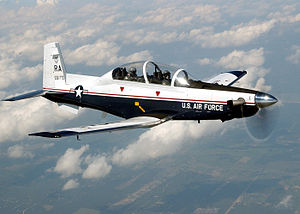T-6B Texan II
| T-6 Texan II | |
|---|---|
 |
|
| A USAF T-6A Texan II flying from Randolph Air Force Base. | |
| Role | Trainer aircraft |
| National origin | United States |
| Manufacturer |
Raytheon Aircraft Company Beechcraft Defense Company |
| First flight | 2000 |
| Introduction | 2001 |
| Status | In production |
| Primary users |
United States Air Force United States Navy Royal Canadian Air Force Hellenic Air Force |
| Produced | 2000–present |
| Number built | over 850 |
| Unit cost |
US$4.272 million
|
| Developed from | Pilatus PC-9 |
The Beechcraft T-6 Texan II is a single-engine turboprop aircraft built by the Raytheon Aircraft Company (which became Hawker Beechcraft and later Beechcraft Defense Company, and was bought by Textron Aviation in 2014). A trainer aircraft based on the Pilatus PC-9, the T-6 has replaced the Air Force's Cessna T-37B Tweet and the Navy's T-34C Turbo Mentor. The T-6A is used by the United States Air Force for basic pilot training and Combat Systems Officer (CSO) training and by the United States Navy and United States Marine Corps for primary and intermediate Naval Flight Officer (NFO) training. The T-6A is also used as a basic trainer by the Royal Canadian Air Force (CT-156 Harvard II), the Greek Air Force, the Israeli Air Force (Efroni), and the Iraqi Air Force. The T-6B is the primary trainer for U.S. student naval aviators (SNAs). The T-6C is used for training by the Mexican Air Force, Royal Air Force, Royal Moroccan Air Force, and the Royal New Zealand Air Force.
The Model 3000/T-6 is a low-wing cantilever monoplane with enclosed tandem seating for two. It is powered by single Pratt & Whitney Canada PT6A-68 turboprop engine in tractor configuration with a four-bladed constant speed propeller and has a retractable tricycle landing gear. The aircraft is fitted with Martin-Baker Mark 16 ejection seats and a canopy fracturing system.
...
Wikipedia
